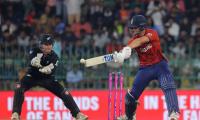Pakistan fast bowler Shoaib Akhtar will play in the second one-day international against India after being rested for the first under a rotation policy, Pakistan captain Inzamam-ul Haq said on Wednesday.
"He has had a slight niggle with his ankle but it would not have prevented him from playing," Inzamam said. "We rested him because we feel we need to keep all our players in prime condition until the World Cup."
"Shoaib had a hard Test series against India on unhelpful tracks and we wanted to give him a long break of a week or so. But he will play in the second match," Inzamam said.
The second match is on February 11 in Rawalpindi. The home side won the first game in Peshawar.
Inzamam said every player, including himself, would be rested when possible under the rotation policy and that reserve players would be given a chance.
"Basically we have around 18 to 20 players in mind for the World Cup and we want to try out this rotation policy with them," Inzamam said. "It is important that not only are our top players properly fit for the World Cup but also that the bench players get enough chance to play at the top level and keep in tune."
Pakistan has previously avoided rotating players, while other countries have employed the system. Australia rested captain Ricky Pointing for games of the VB series against South Africa and Sri Lanka.
Inzamam, who missed the final Test against India in Karachi due to a chronic back problem, said he wanted to include reserve players in the first 11 in the ongoing series against India.
"I would like to see Faisal Iqbal, Umar Gul, Imran Farhat, Arshad Khan get proper games in this series. It is important for us to build up our bench strength," he said.
But the Pakistan skipper conceded the team still had a problem at opener and that he was also looking for a stand-by wicketkeeper.
"We have tried Shoaib Malik in the Tests and wicketkeeper Kamran Akmal in the one-dayers as make-shift openers but we are keen to finalise a permanent pair, and also find a back up for Akmal who is taking too much load these days."










